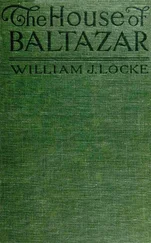William Locke - The Joyous Adventures of Aristide Pujol
Здесь есть возможность читать онлайн «William Locke - The Joyous Adventures of Aristide Pujol» — ознакомительный отрывок электронной книги совершенно бесплатно, а после прочтения отрывка купить полную версию. В некоторых случаях можно слушать аудио, скачать через торрент в формате fb2 и присутствует краткое содержание. Жанр: foreign_language, Прочие приключения, foreign_prose, на английском языке. Описание произведения, (предисловие) а так же отзывы посетителей доступны на портале библиотеки ЛибКат.
- Название:The Joyous Adventures of Aristide Pujol
- Автор:
- Жанр:
- Год:неизвестен
- ISBN:нет данных
- Рейтинг книги:3 / 5. Голосов: 1
-
Избранное:Добавить в избранное
- Отзывы:
-
Ваша оценка:
- 60
- 1
- 2
- 3
- 4
- 5
The Joyous Adventures of Aristide Pujol: краткое содержание, описание и аннотация
Предлагаем к чтению аннотацию, описание, краткое содержание или предисловие (зависит от того, что написал сам автор книги «The Joyous Adventures of Aristide Pujol»). Если вы не нашли необходимую информацию о книге — напишите в комментариях, мы постараемся отыскать её.
The Joyous Adventures of Aristide Pujol — читать онлайн ознакомительный отрывок
Ниже представлен текст книги, разбитый по страницам. Система сохранения места последней прочитанной страницы, позволяет с удобством читать онлайн бесплатно книгу «The Joyous Adventures of Aristide Pujol», без необходимости каждый раз заново искать на чём Вы остановились. Поставьте закладку, и сможете в любой момент перейти на страницу, на которой закончили чтение.
Интервал:
Закладка:
“But what can you do, my poor M. Pujol?” she asked.
“You will see,” he replied.
They parted. He watched her until she became a speck and, having joined the other speck, her husband, passed out of sight. Then he set out through the burning gardens towards the Hôtel du Luxembourg, at the other end of the town.
Aristide had fallen in love. He had fallen in love with Provençal fury. He had done the same thing a hundred times before; but this, he told himself, was the coup de foudre – the thunderbolt. The beautiful Arlésienne filled his brain and his senses. Nothing else in the wide world mattered. Nothing else in the wide world occupied his mind. He sped through the hot streets like a meteor in human form. A stout man, sipping syrup and water in the cool beneath the awning of the Café de la Bourse, rose, looked wonderingly after him, and resumed his seat, wiping a perspiring brow.
A short while afterwards Aristide, valise in hand, presented himself at the bureau of the Hôtel de la Curatterie. It was a shabby little hotel, with a shabby little oval sign outside, and was situated in the narrow street of the same name. Within, it was clean and well kept. On the right of the little dark entrance-hall was the salle à manger , on the left the bureau and an unenticing hole labelled salon de correspondance . A very narrow passage led to the kitchen, and the rest of the hall was blocked by the staircase. An enormous man with a simple, woe-begone fat face and a head of hair like a circular machine-brush was sitting by the bureau window in his shirt-sleeves. Aristide addressed him.
“M. Bocardon?”
“At your service, monsieur.”
“Can I have a bedroom?”
“Certainly.” He waved a hand towards a set of black sample boxes studded with brass nails and bound with straps that lay in the hall. “The omnibus has brought your boxes. You are M. Lambert?”
“M. Bocardon,” said Aristide, in a lordly way, “I am M. Aristide Pujol, and not a commercial traveller. I have come to see the beauties of Nîmes, and have chosen this hotel because I have the honour to be a distant relation of your wife, Mme. Zette Bocardon, whom I have not seen for many years. How is she?”
“Her health is very good,” replied M. Bocardon, shortly. He rang a bell.
A dilapidated man in a green baize apron emerged from the dining-room and took Aristide’s valise.
“No. 24,” said M. Bocardon. Then, swinging his massive form halfway through the narrow bureau door, he called down the passage, “Euphémie!”
A woman’s voice responded, and in a moment the woman herself appeared, a pallid, haggard, though more youthful, replica of Zette, with the dark rings of sleeplessness or illness beneath her eyes which looked furtively at the world.
“Tell your sister,” said M. Bocardon, “that a relation of yours has come to stay in the hotel.”
He swung himself back into the bureau and took no further notice of the guest.
“A relation?” echoed Euphémie, staring at the smiling, lustrous-eyed Aristide, whose busy brain was wondering how he could mystify this unwelcome and unexpected sister.
“Why, yes. Aristide, cousin to your good Aunt Léonie at Raphèle. Ah – but you are too young to remember me.”
“I will tell Zette,” she said, disappearing down the narrow passage.
Aristide went to the doorway, and stood there looking out into the not too savoury street. On the opposite side, which was in the shade, the tenants of the modest little shops sat by their doors or on chairs on the pavement. There was considerable whispering among them and various glances were cast at him. Presently footsteps behind caused him to turn. There was Zette. She had evidently been weeping since they had parted, for her eyelids were red. She started on beholding him.
“You?”
He laughed and shook her hesitating hands.
“It is I, Aristide. But you have grown! Pécaïre! How you have grown!” He swung her hands apart and laughed merrily in her bewildered eyes. “To think that the little Zette in pigtails and short check skirt should have grown into this beautiful woman! I compliment you on your wife, M. Bocardon.”
M. Bocardon did not reply, but Aristide’s swift glance noticed a spasm of pain shoot across his broad face.
“And the good Aunt Léonie? Is she well? And does she still make her matelotes of eels? Ah, they were good, those matelotes .”
“Aunt Léonie died two years ago,” said Zette.
“The poor woman! And I who never knew. Tell me about her.”
The salle à manger door stood open. He drew her thither by his curious fascination. They entered, and he shut the door behind them.
“ Voilà! ” said he. “Didn’t I tell you I should see you again?”
“ Vous avez un fameux toupet, vous! ” said Zette, half angrily.
He laughed, having been accused of confounded impudence many times before in the course of his adventurous life.
“If I told my husband he would kill you.”
“Precisely. So you’re not going to tell him. I adore you. I have come to protect you. Foi de Provençal. ”
“The only way to protect me is to prove my innocence.”
“And then?”
She drew herself up and looked him straight between the eyes.
“I’ll recognize that you have a loyal heart, and will be your very good friend.”
“Mme. Zette,” cried Aristide, “I will devote my life to your service. Tell me the particulars of the affair.”
“Ask M. Bocardon.” She left him, and sailed out of the room and past the bureau with her proud head in the air.
If Aristide Pujol had the rapturous idea of proving the innocence of Mme. Zette, triumphing over the fat pig of a husband, and eventually, in a fantastic fashion, carrying off the insulted and spotless lady to some bower of delight (the castle in Perpignan – why not?), you must blame, not him, but Provence, whose sons, if not devout, are frankly pagan. Sometimes they are both.
M. Bocardon sat in his bureau, pretending to do accounts and tracing columns of figures with a huge, trembling forefinger. He looked the picture of woe. Aristide decided to bide his opportunity. He went out into the streets again, now with the object of killing time. The afternoon had advanced, and trees and buildings cast cool shadows in which one could walk with comfort; and Nîmes, clear, bright city of wide avenues and broad open spaces, instinct too with the grandeur that was Rome’s, is an idler’s Paradise. Aristide knew it well; but he never tired of it. He wandered round the Maison Carrée, his responsive nature delighting in the splendour of the Temple, with its fluted Corinthian columns, its noble entablature, its massive pediment, its perfect proportions; reluctantly turned down the Boulevard Victor Hugo, past the Lycée and the Bourse, made the circuit of the mighty, double-arched oval of the Arena, and then retraced his steps. As he expected, M. Bocardon had left the bureau. It was the hour of absinthe. The porter named M. Bocardon’s habitual café. There, in a morose corner of the terrace, Aristide found the huge man gloomily contemplating an absurdly small glass of the bitters known as Dubonnet. Aristide raised his hat, asked permission to join him, and sat down.
“M. Bocardon,” said he, carefully mixing the absinthe which he had ordered, “I learn from my fair cousin that there is between you a regrettable misunderstanding, for which I am sincerely sorry.”
“She calls it a misunderstanding?” He laughed mirthlessly. “Women have their own vocabulary. Listen, my good sir. There is infamy between us. When a wife betrays a man like me – kind, indulgent, trustful, who has worshipped the ground she treads on – it is not a question of misunderstanding. It is infamy. If she had anywhere to lay her head, I would turn her out of doors to-night. But she has not. You, who are her relative, know I married her without a dowry. You alone of her family survive.”
Читать дальшеИнтервал:
Закладка:
Похожие книги на «The Joyous Adventures of Aristide Pujol»
Представляем Вашему вниманию похожие книги на «The Joyous Adventures of Aristide Pujol» списком для выбора. Мы отобрали схожую по названию и смыслу литературу в надежде предоставить читателям больше вариантов отыскать новые, интересные, ещё непрочитанные произведения.
Обсуждение, отзывы о книге «The Joyous Adventures of Aristide Pujol» и просто собственные мнения читателей. Оставьте ваши комментарии, напишите, что Вы думаете о произведении, его смысле или главных героях. Укажите что конкретно понравилось, а что нет, и почему Вы так считаете.












